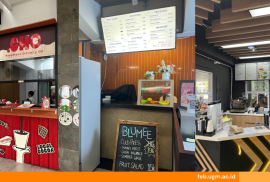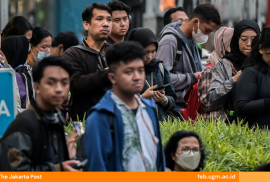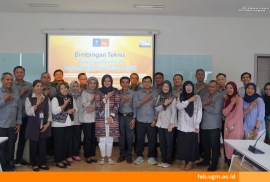A professor from the Faculty of Economics and Business of Universitas Gadjah Mada (FEB UGM), Prof. Dr. Catur Sugiyanto, M.A., participated in the international conference 2024 Seminar of UNESCO Regional Network of Natural Products Chemistry for Safety and Well-being in Pan-Asia and the Pacific (URSWAP). The conference was held from December 12-14 in Shanghai, China.
The URSWAP Conference is a collaborative effort between the Shanghai Institute of Materia Medica (SIMM), UNESCO, the Alliance of International Science Organizations (ANSO), and the UNESCO Regional Network of Natural Product Chemistry for Safety and Well-being in Pan-Asia and the Pacific (URSWAP). With the theme “Development and Utilization of Natural Products for Human Well-being”, the event attracted participants from various countries, including Uzbekistan, Turkmenistan, Azerbaijan, Mongolia, Laos, Thailand, Malaysia, South Korea, Japan, Australia, New Zealand, Indonesia, and China. This forum is a global platform to discuss innovations based on environmentally friendly and sustainable natural resources.
Catur Sugiyanto, an Institute for Natural Dyes Innovation (INDI) member at UGM, presented a paper titled “Applying Contract Farming to Mangrove Farmers: Supporting Natural Dye Sources from Mangrove”. He discussed the potential application of contract farming models for mangrove farmers in Kampung Laut, Cilacap Regency, Central Java.
“This research supports the Shanghai Institute of Materia Medica (SIMM) program by using natural dyes from mangroves as a healthier alternative for people. In addition, these natural dyes are more environmentally friendly compared to synthetic dyes, thus contributing to a sustainable textile industry,” he explained.
Catur emphasized that preserving mangroves is vital as a source of natural dyes and is critical in protecting coastal communities from erosion and sea level rise caused by climate change. In addition, mangroves provide habitat for various species of fish and marine life, contributing to the sustainability of fisheries resources.
“Mangroves also have great potential to be developed as ecotourism destinations, which can increase the income of local communities,” Catur added.
In the proposed contract farming model, he continued, mangrove farmers would work with the textile industry, such as Gama Indigo under the INDI UGM umbrella, to produce and market natural dyes derived from mangrove bark. This approach is expected to transform mangrove ecosystems into economic resources while ensuring their preservation for future generations. The model also includes technical assistance, market access, and community-based management to ensure quality and compliance with environmental standards.
Catur said the introduction of contract farming could provide stable economic incentives for mangrove farmers while ensuring the sustainability of mangrove ecosystems. The program directly supports the achievement of several Sustainable Development Goals (SDGs), including responsible consumption and production, climate action, and poverty alleviation. With the support of SIMM, UNESCO, ANSO, and URSWAP, Catur hopes the proposed approach can inspire cross-sectoral collaboration to improve human well-being and global environmental conservation.
Reportage: Shofi Hawa Anjani
Editor: Kurnia Ekaptiningrum
Sustainable Development Goals












